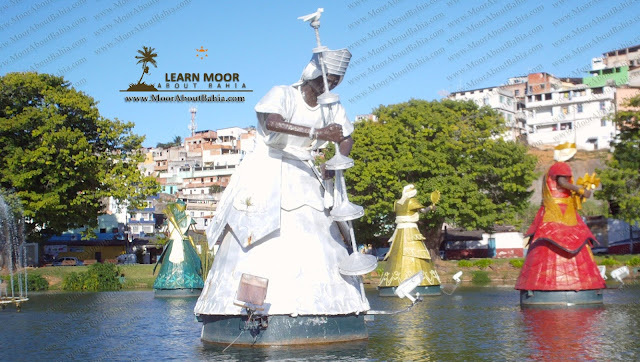Pages For Salvador Bahia Brasil Resources for Travel in Brazil
Showing posts with label Candomblé. Show all posts
Showing posts with label Candomblé. Show all posts
Saturday
IEMANJA/YEMAYA FESTIVAL IN BAHIA, BRAZIL 2011
Here is some footage of the Procession for Yemaya recorded February 2nd, 2011 in Salvador, Bahia - Brasil.
Truly Magical Event. Pretty cool to witness.
If you are interested in visiting Bahia, Brazil to witness events like this live go here: www.bahiabraziltours.com
Yemaya is an orisha, originally of the Yoruba religion, who has become prominent in many Afro-American religions. Africans from what is now called Yorubaland brought Yemaya and a host of other deities/energy forces in nature with them when they were brought to the shores of the Americas as captives. She is the ocean, the essence of motherhood, and a protector of children.
Thursday
Orishá Statues at Dique Do Tororo | Orixás Candomble in Bahia Brasil
The orishá live in Bahia, Brasil. They are alive and well. This is especially evident in Salvador, the state capital of Bahia. Depictions of the orishá (orixás alt. spelling), are found in the various ruas (streets) and plazas of Salvador, Bahia, Brasil. They are literally visible throughout the city. The Orishá are the deities of the Afro-Brazilian religion Candomble.
One example is the painted mermaid statue in the neighborhood of Rio Vermelho associated with Yemanja, mother goddess figure, which overlooks the sea. Another example is the statue of Exu, the orishá who manages all types of communication and guardian of the crossroads, which is located, fittingly, in front of Salvador’s central correiro (post office).
One of the most impressive depictions of the orishá, however, is located on a big lake and recreation park in the middle of the city called Dique do Tororo, which contains a group of orishá statues dancing in a circle on the surface of the water. Dique do Tororo looks just as impressive as it sounds.
Throughout this article you will see photos taken by my wife while visiting Dique do Tororo with a friend. She took a boat tour that is available daily for only $20 reais. We definitely recommend the boat tour for anyone visiting Bahia, Brasil. Be sure to check out our Bahia Tour site to schedule any tours in Bahia.
First let’s talk a little about "The Most African City of Brazil", Salvador, Bahia.
Friday
CANDOMBLÉ
This was taken from Wikipedia.
The religion is based in the anima (soul) of Nature, and is also known as Animism. It was developed in Brazil with the knowledge of African Priests that were enslaved and brought to Brazil, together with their mythology, their culture and language, between 1549 and 1888.
The rituals involve the possession of the initiated by Orishas, offerings and sacrifices of the mineral, vegetable and animal kingdom, healing, dancing/trance and percussion. Candomblé draws inspiration from a variety of people of the African Diaspora, but it mainly features aspects of Yoruba orisha veneration.
Overview
In many parts of the Latin America, Orishás are now conflated with Roman Catholic saints. This religion, like many African religions, is an oral tradition and therefore has not been put into text throughout the years. Only recently have scholars and people of this religion begun to write down their practices. The name Batuque is also used, especially before the 19th century when Candomblé became more common. Both words are believed to derive from a Bantu-family language, mainly that of (Kongo Kingdom).Candomblé may be called Macumba in some regions, notably Rio de Janeiro and São Paulo, although
Subscribe to:
Posts (Atom)
.png)



